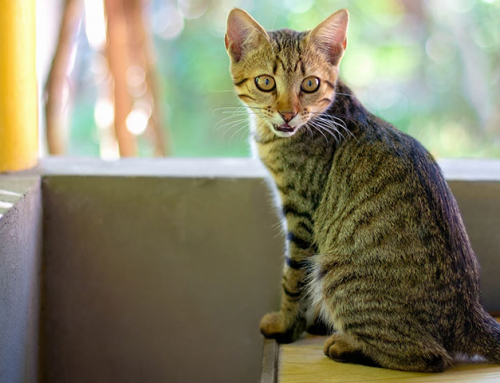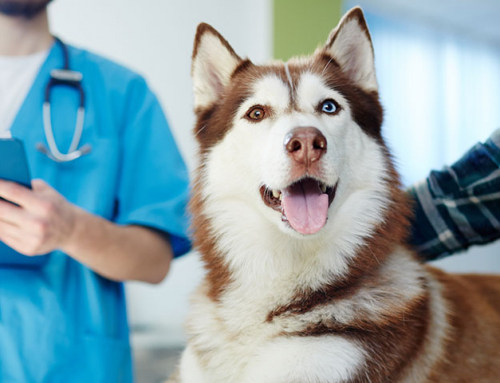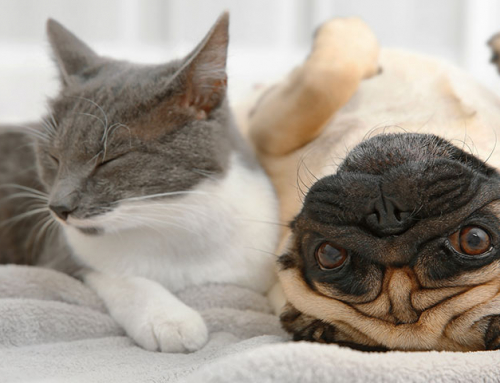This week I received an email from one of our readers asking what to expect as her cat seems to be going into diabetic remission. So I got out my crystal ball and… Wait! I don’t have a crystal ball. How it plays out varies from pet to pet. I suppose what I can share with you is what I have seen over the years with some of my feline patients who have gone into remission. And I can offer some pointers to help keep the kitty in remission.
Cats are usually type 2 diabetics, meaning they may yet produce insulin but don’t react to it as well as they should. This is called insulin resistance. Factors that commonly cause insulin resistance include obesity, high carbohydrate diets (such as cat kibble), infections (such as dental disease) and lack of exercise (rampant with indoor kitties). If we address these issues and provide them with supplemental insulin, a good portion of cats can go back into a non-diabetic state. This is called remission. How amazing is it that we can turn the situation around and actually “cure” these cats!
Now, how this plays out varies. If you are very attuned to your diabetic feline and monitor the blood glucose at home, you will have a better outcome. As much as we hope for diabetic remission, if we fail to notice signs of diabetic resolution, the typical dose of insulin that had been working just fine for months might result in hypoglycemia. Mild hypoglycemia may not be noticed. Moderate hypoglycemia may look like a drunken cat. If the blood glucose gets below 20 or 30 mg/dl, the pet could seizure. If no one is home, this could be life threatening.
To avoid tragic events like this one, I want all my clients with a diabetic to have a glucose meter at home. I keep close contact with them. If the pet is acting odd or goofy in any way, I have them check a glucose value. If the glucose level is low I have them feed the pet immediately. All my clients have my cell phone number so they can text me in case of emergencies. And I make sure they know the locations of the local ER clinics in case I’m unavailable. And of course, they do periodic blood glucose curves and monitor the pet’s weight and how much the pet is drinking and peeing.
I’ve had a few cats present to the clinic in hypoglycemia and we’ve never had to give insulin again. I’ve also seen kitties present in hypoglycemia and we’ve had to progressively lower the insulin dose. When a diabetic pet owner is observant, it is more common for us to gradually wean the cat off insulin.
Some diabetic pet owners will check a blood glucose before each injection of insulin. I don’t think this is necessary for all diabetic pets, but if a client with a diabetic cat is striving for tight glucose regulation in hopes of remission (a cat phenomenon), they probably do already check the blood glucose twice daily. If we suspect that a cat is going into remission, I definitely want the pet owner to check the glucose before each injection. If the glucose level is in the normal range I would skip that dose of insulin. Or, if the glucose level is elevated but nominally so, they might give half the regular dose. I won’t say specifics here, as this is something you must discuss with your own veterinarian who has physically examined your pet.
Okay, let’s say you have seen your cat through to the point where you have achieved diabetes remission. Does this mean you can sit back and resume old habits, most specifically dry cat food? Nope. You should continue to feed a canned, low carbohydrate food to your kitty. You should also strive to keep your cat’s waistline slim. Obesity, high carb diets, and lack of exercise are the most common risk factors that triggered the type 2 diabetes in the first place.
If you’ve finished this article and wonder why I kept referring to cats regarding possible remission, it is because cats usually start as type 2 diabetics (non-insulin dependent diabetics). Some cats may later become type 1 (insulin dependent diabetics), but initially we have a chance of turning their diabetes around. Dogs, unfortunately, are most often type 1 diabetics. It would be quite rare for a diabetic dog to go into remission. Dogs may have insulin resistance from obesity, infection and lack of exercise. Addressing these factors can significantly improve their quality of life and diabetic control. Nonetheless, diabetic dogs will probably never go off insulin.
Thanks to our reader who suggested this week’s article idea! If you want to get in touch with me, you can email me at [email protected]
NOTE: Consult your veterinarian to confirm that my recommendations are applicable for the health needs of your pet.







Hi, my cat was on insulin for about 6 weeks, and his numbers dropped significantly over the last few weeks. I am no longer giving him insulin, but his BG is hanging around 50-65 at all hours of the day. I have noticed his appetite has been lower these last few weeks as well and I contribute some of it to the hear. I wondered if you had any insight into this chronic low blood sugar. Thanks!
My 8 yo cat is in diabetic remission!!! I am so happy for him, he’s such a good boy…He was on Lantus since July and has been off since December 10th. I continue with their feeding regimen ( he has a sister and I have an almost 17 yo cat), just to keep them on a schedule, plus they got so used to it I have 3 sets of eyes looking down on me if I’m not up at 5am…Thanks so much for your highly informative articles, I did learn a lot.
Thank you for your kind words. And great job getting your sweetie into remission!
i was left a cat that has diabettes hes maybe 13-15 he was on dm salvory which i found out has 14 grams of carbs and is the worst food ever, i need help please, i am left with 7 cats and know nothing about half of them, i been reading alot of this diabetic info and it seems that my vet over looked alot of stuff and i changed to pate and bought a machine, that i cant figure out.. need to know what to do next, please if i feed low carb diet do i lower it and when do i check sugar levels..
I think Purina DM is one of the best diets for diabetic cats.
If you google the meter online you usually can find videos showing how to use the glucose meter. Each meter is a little different.
If you want a really good article on dog and cat diabetes I urge you to read the 2018 AAHA Diabetes Guidelines which are free online. Veterinarypartner.com also has a bunch of great pet diabetes articles. Education is key. Be sure and chat with your veteririan who has examined your pet.
Best, Joi
Have a chat with your veterinarian.
Hi…. my cat is now five weeks without insulin and his number have not been over 178. The last week I have noticed he is not eating as much. This morning his number was 100. Is that normal?
That’s great. Do continue to monitor the blood glucose as remission isn’t necessarily a forever situation. You’ll want to feed a low carb diet and proper body weight to hopefully keep your kitty in remission. And of course do what your veterinarian suggests. Congratulations!
My cat became diabetic for one week. I was constantly monitoring him and got him back into remission for 7 months. Then I made a mistake of putting dry Purnia DM in his wet DM food. Numbers went back up. Been on one unit twice a day for about six -seven months…. last month he has not been over 168. Took him to the Vet and he thought I could try to put him on remission again but still give him one shot a day. How is that remission? I have been giving him one shot but if he is at 150 and below….I will not give him a shot. Should I just stop giving the shots all together and closely monitor… if he goes back into the 200s…. Yesterday he was 119 and 123 so I did not give him a shot either time. This morning he was at 143 so give him a shot. He is taking Basaglar injections.
Thank you
I cannot give detail d advice for a pet that I’ve not examined, but checking the glucose and giving insulin when needed is how we assess if a pet is going in Tom remission. As yo7 found out, remission is not necessarily forever. Canned low carb food forever and keeping an eye on the pet’s Glucose is important. We don’t have a crystal ball to know if your pet will go into remission a 2nd time but it is seeming possible based on the numbers you mention. Be sure to always strive for proper body weight and minimizing anything else that can cause insulin resistance such as infection (such as dental disease or urinary tract infections). Best, Joi
Very encouraging article. I adopted a diabetic in 07/2020 that was diagnosed in 03/2020 & only treated with insulin for about 2 weeks. I have had him on insulin & monitoring him since adoption day. 1.5 months later he is down to 0.25U BID & I see him OTJ soon. His #’s have been great the past 2 days & hoping this trend continues. Very hopeful. Kingston is my 2nd diabetic, the 1st went into remission & I eventually lost him to cancer.
Hi. My cat went into remission 4 yrs ago. Now she is back to being diabetic. Can she go back into remission? Why did she become diabetic again? I did not change her diet.
After 4 month’s strict treating and monitoring of my cat’s diabetes (following a near-fatal case of ketoacoidosis), we today received the joyful news that she is in remission, and I want to tell the world!
I want to thank you for your article- I want to do all I can to keep my beloved Drusilla well, and this is so informative and detailed. Thank you! 🙂